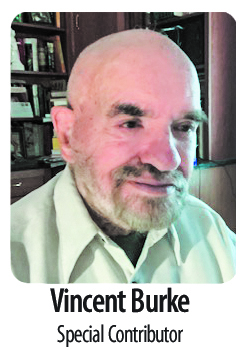A lesson for anyone hiding an important secret
 We all have our regrets in life. Mary is mine.
We all have our regrets in life. Mary is mine.
Mary and I were both young reporters at the Cleveland News. The morning we met she had been with the paper just a week.
“Hello. I’m Mary,” she said, startling me as I was typing. I looked up to see, standing next to me, a young woman, perhaps two or three years older than my age of 21, clad smartly in a navy suit. I saw her round face and short, ash brown hair, but what I fixated on was her broad, welcoming smile and clear blue eyes.
I stood up to introduce myself, but she stopped me, saying, “You’re Vincent, and you’re on the police beat. I saw you the other day and asked about you.” Mary added that she had time to go to breakfast with me as soon as I finished typing my story.
We went to breakfast that morning and to many long lunches in the days and weeks to come. I always hated for lunch to end because I so enjoyed our conversations. Our get-togethers always included laughter.
Mary was knowledgeable on everything; she became my mentor. Through talking with her at our lunches, I was being educated and learning more than in the evening college classes I was taking. She was the rare kind of woman that I could relax with, without worrying whether I was handsome enough, macho enough, sophisticated enough. Maybe it all came down to her being a little plain, so that I didn’t feel inferior to her. What importance we all put on physical attractiveness!
Mary was a wee bit overweight — just a few pounds. But those few pounds made her face too round. I could see that she worked to overcome this, and she succeeded, mainly. She always wore a fine, tailored suit, a frilly white or flowered blouse and a simple strand of pearls or gold chain. She easily outshone the other female reporters at the paper.
Soon, Mary and I were seeing each other several times a week. I never had told anyone at work that I was gay, and that included Mary. As a result, I became aware of a growing problem: I considered our friendship platonic, but Mary was frequently hinting at a romance. I was trying to limit our meetings to the daytime, but she kept coming up with ideas for the evening: a play, dinner with friends on a Saturday night, an event at her college. I had to create excuses.
Mary had the idea that the two of us should go visit her relatives in San Francisco. But I resisted. If I were going to San Francisco, it’s the gay scene I’d want to see, not Mary’s relatives.
Then one day a malevolent missive appeared in my mother’s mailbox. I was home alone that day and collected the mail. It was a small, white envelope, addressed to my mother in rather child-like printed handwriting.
For some reason, I felt compelled to open that envelope, and when I did, I was stunned. Inside was a single piece of white lined notebook paper with printed letters handwritten in ink. I remember the exact wording: “Stop turning your son into a mama’s boy.”
My heart sank. I felt humiliation, but I was relieved that no one would see the note but me.
I examined the address on the envelope. It was written as “222d Street.” I noted the peculiar way the number was written, as the address is customarily written as 222nd Street, with an “nd” after the number rather than just a “d.”
The next time I went in to work, Mary was out. I casually sauntered over to her desk and observed her calendar on the wall: “32d Street, 142d Street.” Both addresses were also missing the “n” after the number.
I never spoke to Mary again. There was never another lunch, no more animated conversations. It was the end of one of the best relationships of my life. And it ended because I had not had the courage to tell Mary at the start that I was gay — in an era when it took courage to do so — so that, upfront, she would not assume our relationship would progress to romance.
Even after I relocated to Manhattan, I never forgot Mary and yearned for her friendship I had lost. I tracked her life closely: She never married, but she did become a celebrated journalist.
One time when visiting my mother at Easter, I saw Mary’s photo in the paper in the Easter Parade. How long had it been? Twenty years, 30?
I pondered over the photo of Mary for long minutes, recalling happy memories and yet sad at all the time I had missed with my friend. I wanted to call her, yet I felt I would have to tell her, and I still didn’t have the courage to do that.
Was I to blame for the breakup? Did I drive Mary to send that letter by not telling her I was gay? She naturally expected more. Should I have ignored her letter as a misstep to be forgiven?
Several years later when I was again visiting, I got the paper from my mother’s porch one morning and opened it to the front page. There, prominently placed, was an article with photo: Mary’s obituary. She had died suddenly.
I did not go to the funeral. It was too late now. It was too late for honesty.
Vincent Burke is a former ad man. He is the author of Forgiveness. A Gay Man’s Memoir.














I do hope the writer also recognizes how cruel and insidious her letter was. Big red flag in my eyes. He’s actually better off just mourning the friendship and not the person. Very sad story.